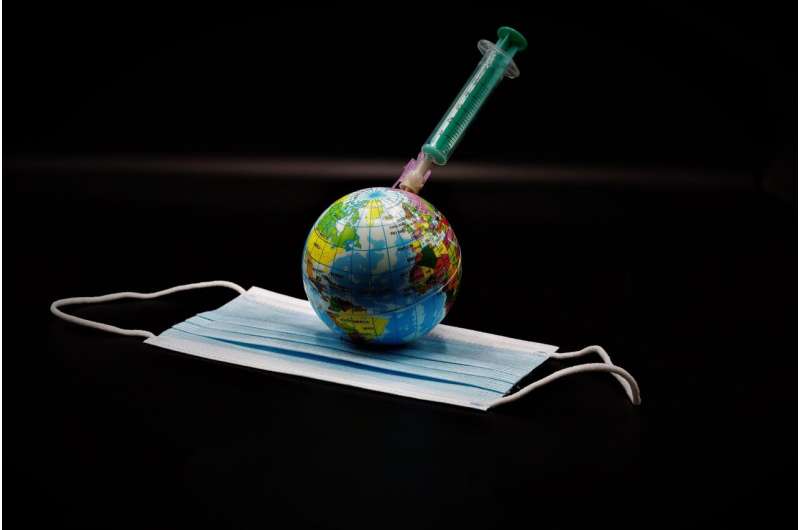Coronavirus vaccines are coming, but when will they arrive?

Coronavirus vaccines are coming, offering hope for a world rocked by pandemic, but USC experts say how soon they'll become available—and in what form—is not yet clear.
Big pharma and government labs around the world are spending billions of dollars on research. Merck & Co. is in the hunt, and the CEO of Pfizer Inc. said in a recent Forbes article that he aims to have a vaccine ready by Jan. 1.
Though vaccines usually take longer than a year to develop, it is possible to deliver one even sooner, according to Pin Wang, professor of materials sciences and biomedical and chemical engineering at the USC Viterbi School of Engineering.
"By the end of the year, it should be clear if this is doable. I am optimistic because the data is looking promising," said Wang, whose work in molecular engineering is focused on understanding immune system responses and developing new treatments, including vaccines, for diseases.
Coronavirus vaccines could come in waves
Oxford University has emerged as a frontrunner, advancing a potential vaccine that's shown positive early results and is advancing to clinical trials that involve thousands of people. The Massachusetts-based biotech company Moderna also is working on a vaccine that is expected to move to large-scale clinical trials next month. More than 100 potential vaccines for COVID-19 are in development around the world.
Vaccines can be designed through any of these four approaches:
- From antigens delivered by DNA/RNA that are injected into muscle cells and prompt the body to manufacture agents that harm the coronavirus.
- From a protein derived from the coronavirus.
- Via a hybrid virus.
- From an injection of chemically treated coronavirus that disables its growth and spread.
In each instance, the intent is to promote the body's natural defenses, Wang explained.
Paula Cannon, Distinguished Professor of Molecular Microbiology and Immunology at the Keck School of Medicine of USC, says it's likely that effective solutions could emerge from each of the various experimental platforms, leading to a variety of vaccines. She is an expert in how viruses are transmitted and controlled.
"We're going to have a range of solutions—with, say, a version 1.0 vaccine that is good enough and better than nothing—available quickly, followed by better vaccines next year using different platforms, like versions 2.0 and 3.0," she said.
"The early vaccines may have some limitations, but they will provide much more protection than we have now and it will be full steam ahead to distribute it far and wide. We shouldn't allow the perfect to be the enemy of the good."
Producing a vaccine by Jan. 1 might be impossible
But Professor Frances Richmond, an expert in clinical trial regulatory issues, notes that the drug approval process in the United States is notoriously slow and cautious, posing a potential hurdle to bringing a new vaccine to market. Richmond is the founding chair of the Department of Regulatory and Quality Sciences at the D.K. Kim International Center for Regulatory Science at the USC School of Pharmacy.
It usually takes about two years to bring a new drug to market, even after large clinical trials are underway, although priority drugs can advance faster, she said.
It's an elaborate process, involving lab tests, animal experiments and human trials, plus ensuring that adequate production facilities, quality control and distribution chains are in place. The Food and Drug Administration rigorously scrutinizes each step to ensure products cause no significant harm to people, Richmond explained.
"The development and approval path for a vaccine is long and fraught with hurdles. Any one of those could affect the release of the product," she said. "To have a commercially available drug by Jan. 1 will be very challenging and perhaps impossible. It is a really difficult process with a lot of variables."
The three advantages that could lead to a fast, viable vaccine
So how do researchers overcome those obstacles? What gives them hope they can bring a viable vaccine to market soon? The answers are found in the disruption of the business-as-usual model to drug approval and calculated compromises to solve an urgent problem.
There are three big advantages propelling progress to find a cure. First, the global research collaboration is unprecedented, with labs and companies and scientists worldwide working closely together to tackle the problem. The quest for this vaccine proceeds like a team sport with a lot of collaboration, Cannon said, and research occurs broadly and simultaneously, rather than sequentially, and can hasten the vaccine's path to the market.
"It's not necessarily a race between companies, but it's about many people working together as the human race against the virus," Cannon said.
Second, scientists have tools available today to fight this pandemic that they lacked in previous big outbreaks. For example, advanced technologies for battling infectious diseases now include genetic engineering, gene sequencing, electron microscopes, supercomputers, machine learning and global communications.
Third, the novel coronavirus is "not very stealthy or tricky," Cannon said. It doesn't seem to have lots of defense mechanisms or evasive measures, unlike other challenging viruses such as HIV or influenza. Scientists are increasingly confident that it can be stopped.
Compromise is also part of the path forward. That is, it's unlikely every checkbox will be met in developing a coronavirus vaccine. Clinical trials will be conflated, scalability questions may not be fully resolved and potency and efficacy will improve in later vaccine versions. The threats to global health and economies are too great to delay.
"Right now, we're on an accelerated path to vaccine development for coronavirus while paying sufficient attention to the potential side effects," Wang said. "We are cutting a lot of corners because we are desperate, so there's urgency. We have to be sure the product doesn't cause harm. It's a very challenging task, but that's the only option right now. We don't have much choice."





















